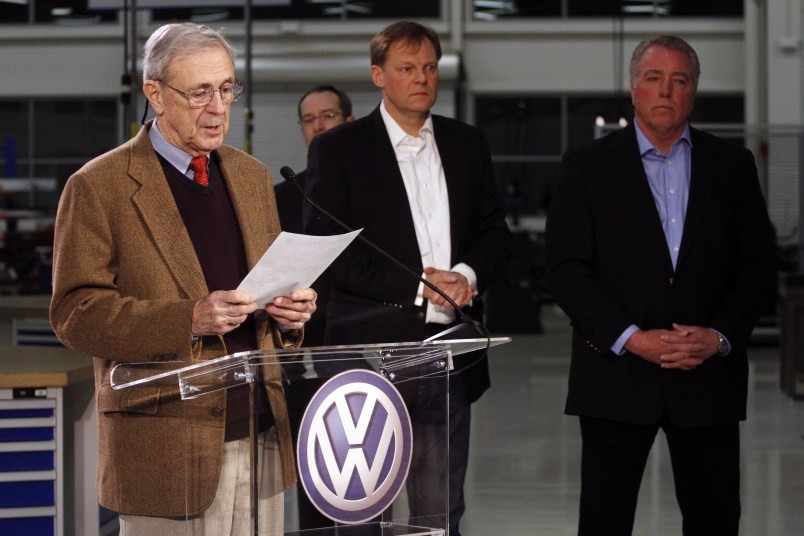CHATTANOOGA, Tenn. (AP) — Workers at a Volkswagen factory in Tennessee have voted against union representation, a devastating loss that derails the United Auto Workers union’s effort to organize Southern factories.
The 712-626 vote released late Friday stunned many labor experts who expected a UAW win because Volkswagen tacitly endorsed the union and even allowed organizers into the Chattanooga factory to make sales pitches.
The loss is a major setback for the UAW’s effort to make inroads in the growing South, where foreign automakers have 14 assembly plants, eight built in the past decade, said Kristin Dziczek, director of the labor and industry group at the Center for Automotive Research, an industry think tank in Michigan. “If this was going to work anywhere, this is where it was going to work,” she said of Chattanooga.
Organizing a Southern plant is so crucial to the union that UAW President Bob King told workers in a speech that the union has no long-term future without it.
But the loss likely means the union will remain quarantined with the Detroit Three, largely in the Midwest and Northeast.
Many viewed VW as the union’s only chance to gain a crucial foothold in the South because other automakers have not been as welcoming as Volkswagen. Labor interests make up half of the supervisory board at VW in Germany, and they questioned why the Chattanooga plant is the only one without formal worker representation. VW wanted a German-style “works council” in Chattanooga to give employees a say over working conditions. The company says U.S. law won’t allow it without an independent union.
In Chattanooga, the union faced stern opposition from Republican politicians who warned that a UAW victory would chase away other automakers who might come to the region.
Sen. Bob Corker of Tennessee was the most vocal opponent, saying that he was told that VW would build a new SUV in Chattanooga if workers rejected the union. That was later denied by a VW executive. Other politicians threatened to cut off state incentives for the plant to expand if the union was approved.
After 53 percent of the workers voted against his union, King said he was outraged at what he called “outside interference” in the election. He wouldn’t rule out challenging the outcome with the National Labor Relations Board. “It’s never happened in this country before that the U.S. senator, the governor, the leader of the House, the legislature here, threatened the company with no incentives, threatened workers with a loss of product,” King said. “We’ll look at all our options in the next few days.”
The union could contend that Corker and other local politicians were in collusion with VW and tried to frighten workers into thinking the SUV would be built in Mexico if they voted for the union, said Gary Chaison, a labor relations professor at Clark University in Worcester, Mass.
But Chaison said it will be difficult to tie the politicians to the company, which remained neutral throughout the voting process. “It’s the employer that has real power,” he said.
The loss put a spotlight on the union’s major difficulty in the South: signing up people who have no history with organized labor and are fearful of being the first in the area to join, Chaison said.
Dziczek said the union may have to change its tactics in future organizing efforts, because King’s strategy of the union and company working together to help each other did not work.
But she does not expect the well-funded union to give up on organizing Southern factories. “I think they will continue to push everywhere they were pushing and see if they get more traction,” she said.
Republican Gov. Bill Haslam said through a spokesman that he was pleased with the vote and “looks forward to working with the company on future growth in Tennessee.”
____
Krisher reported from Detroit.
Copyright 2014 The Associated Press. All rights reserved. This material may not be published, broadcast, rewritten or redistributed.






